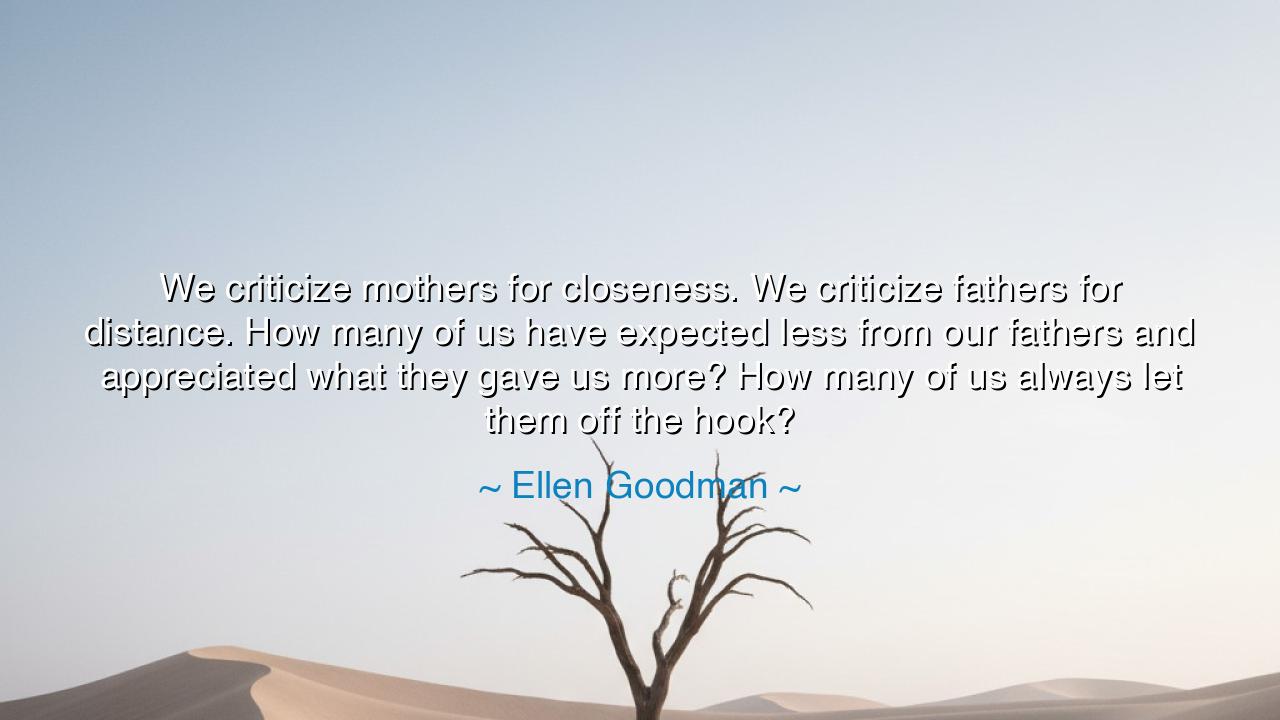
We criticize mothers for closeness. We criticize fathers for
We criticize mothers for closeness. We criticize fathers for distance. How many of us have expected less from our fathers and appreciated what they gave us more? How many of us always let them off the hook?






The words of Ellen Goodman are sharp, unsettling, and true: “We criticize mothers for closeness. We criticize fathers for distance. How many of us have expected less from our fathers and appreciated what they gave us more? How many of us always let them off the hook?” In this observation, Goodman unmasks the imbalance of our expectations, the way society has long measured men and women by different weights in the sacred duty of parenting. Mothers are often burdened with the demand of endless sacrifice, criticized when they are too protective, while fathers, expected to be distant, are praised for even the smallest gesture of attention. Her words challenge us to confront these double standards and to seek justice in how we view love, care, and responsibility within the family.
The ancients also wrestled with this tension, though in their language it was cast in terms of duty and honor. Fathers were praised for provision and authority, while mothers were tasked with nurture and sacrifice. Rarely were fathers expected to stoop to tenderness, nor were mothers excused from constant presence. Goodman’s words show us that these patterns, though cloaked in the garments of tradition, often leave wounds unspoken. For when one parent is overburdened and the other excused, children inherit not balance, but inequality in love.
Consider history’s witness in the life of Theodore Roosevelt. When his wife died, Roosevelt, overwhelmed by grief, withdrew from his infant daughter’s life, leaving her largely to the care of relatives. Though he adored her in later years, the absence of a father in her earliest moments left a mark upon her spirit. His retreat was forgiven, even excused as the way of men, but would a mother have been granted such leniency? Goodman’s words speak directly to this truth: fathers are often let “off the hook,” their distance rationalized, while mothers are judged harshly for any perceived shortcoming.
The wisdom here is not to condemn fathers, but to awaken us all to fairness. For true parenting is not the labor of one alone, but the shared responsibility of both. To hold mothers to impossible standards while excusing fathers from deeper engagement is to rob children of balance and to rob fathers of their full humanity. The closeness of a mother and the presence of a father should not be placed in opposition, but woven together as threads of the same tapestry.
Goodman’s words also call us inward: how many of us, in our own lives, have quietly accepted less from our fathers than we should? How often have we praised them for occasional kindnesses while expecting daily sacrifices from our mothers? Such unequal gratitude distorts our memories and blinds us to the deeper wounds carried within families. To recognize this imbalance is the first step toward healing, and to call both parents to equal responsibility is to honor children with the gift of wholeness.
The lesson for us is clear: we must demand more, not less, from our fathers, and grant more grace, not less, to our mothers. Let us end the practice of criticizing women for too much love and praising men for too little. Instead, let us encourage all parents, regardless of gender, to be both tender and strong, both present and wise. For children need not halves of love, but its fullness.
Practically, this means fostering a culture where fathers are expected to nurture as deeply as mothers, and mothers are freed from crushing perfectionism. It means rethinking praise: no longer applauding fathers for “helping” with what is their duty, and no longer shaming mothers for the natural closeness they bring. And in our own lives, it means looking back with honesty at what we have excused and what we have demanded, resolving to seek balance in our own families and the generations to come.
Thus, Ellen Goodman’s words stand as both challenge and invitation: “We criticize mothers for closeness. We criticize fathers for distance.” Let us break this cycle. Let us raise fathers who do not stand apart, and mothers who are not crushed under impossible weight. Let us see in both parents not the division of roles but the unity of love, so that every child may grow in the fullness of care, nurtured not by halves, but by the wholeness of family.






AAdministratorAdministrator
Welcome, honored guests. Please leave a comment, we will respond soon